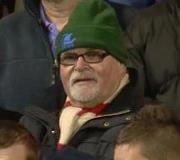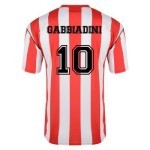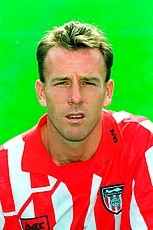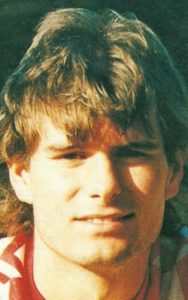
John McCormick writes: we have a manager and the transfer window’s open. A new chapter in the SAFC story is about to begin. But we also have history, some good, some not so and we would do well to remember it. So here, with the hope that the players running up alps in Austria will find it when they when they plug themselves into their alternative worlds, is some of that history, courtesy of Pete Sixsmith.
As we slipped into the Associate Members group at the end of 1987, a new manager came in. He was young, ambitious and he had a good reputation which he hoped to enhance at Roker Park.

Step forward, Dennis Smith who, in his four and a bit seasons as Sunderland manager, took us to two promotions, a play-off win at the Sports Direct, brought Marco Gabbiadini to the club and unfortunately supervised another relegation after a mere one season in the top flight.
We went up because Swindon Town cheated and were denied a place in the top flight. They had thrashed us 1-0 at Wembley in the Play Off Final, the score kept down by a stunning performance from Tony Norman, but they had fiddled the books and we were promoted instead.
It didn’t give us much time for what was going to be the penultimate season of a four division Football League; the FA Premier League was about to descend upon us with its huge TV deal and its relentless focus on a handful of clubs – of which Sunderland were not one. Far better for the television executives to stick to the metropolitan giants than be bothered about the likes of Sunderland, Middlesbrough and Sheffield United.
Transfer activity was limited, although there was no transfer window then – Sky invented that a couple of years later. Peter Davenport came in from Middlesbrough for what was for us, a large fee after a disappointing time at Ayresome Park, which followed on from a disappointing time at Old Trafford, after being a huge success at The City Ground under Brian Clough.
The only other major signing was a man who was straight out of the Smith mould of tough, no nonsense centre halves – one Kevin Ball who joined from Portsmouth and has been quite happy to stay ever since apart from brief stints in West London and East Lancashire.

Other than that, it was a team made up of local lads (Gary Owers, Gordon Armstrong and Dickie Ord), seasoned professionals (Gary Bennett, Tony Norman, and John Kay) and promising youngsters (Kieron Brady, Warren Hawke, and Martin Smith).
I missed the first two games as I was holidaying in Prague. When we played at Carrow Road, I was at Bohemians v Banik Ostrave and when Spurs came calling on the Tuesday night, I was in the Leitner, watching Sparta Prague play VSS Kosice. I still have the Sparta mug in my cupboard.
We lost at Norwich, where John McPhail played his one and only top level game and drew at home to Spurs where Paul Gascoigne, fresh from his exploits in Italia 90, got some fearful abuse for his Newcastle past. I gather he lapped it up.
I got back just in time to see Manchester United beaten 2-1 with the two Garys, Owers and Bennett scoring. Benno’s was a beauty, sneaking past Gary Pallister in the 90th minute to win the game.
Four points from the first three games and we looked settled.
But we soon got dragged into the relegation scrap (although I don’t remember Dennis Smith bemoaning it like some managers do) and by Christmas, we were just above the drop zone.
The Christmas fixtures were not helpful. A Mel Sterland goal gave “Dorty Leed”s a 1-0 win at Roker a couple of days before Santa popped down the chimney and then the fixture computer produced a cracker; Crystal Palace away on Boxing Day with an 11.30 kick off. It wasn’t even a televised game – the London clubs like a morning start so why not give them the most northerly club in the division (The Mags were in their rightful place in the Second Division then). To make matters worse, we went to QPR three days later and lost that one as well.
The defeats were worrying. There were no thrashings but lots of odd goal losses and I think that they are the worst. With a three or four nil, you can make changes but with a 0-1 or a 1-2 it’s getting those tweaks right that keeps you up. The goals dried up too. Marco was carrying an injury and it looked as if the better defenders in the top division could cope with his blistering pace. Davenport, a good, thoughtful player, scored intermittently and after those two, there wasn’t much else.
There was little money available so any pre-deadline purchases had to be absolutely right and had to hit the ground running. Smith brought in Brian Mooney, a Republic of Ireland international from Preston North End to add a bit of creativity to a rather pedestrian midfield. Could he be our saviour? No. He was the 1990 version of Ricky Alvarez (although considerably cheaper). His contribution was minimal, failing to score or create much of an impression and we looked doomed, something which was exacerbated by a 5-0 walloping at Elland Road where we were an embarrassment.

(The German Sub)
That was followed by a home defeat to QPR and a loss at The Dell where Thomas Hauser scored his only First Division goal. He had been injured for much of the season (a role model for Jan Kirchhoff perhaps) but his physicality did give us a bit of a buzz.
In mid-April, we went to Luton Town for the proverbial six pointer. Their chairman was a particularly unpleasant Tory MP called David Evans. After Millwall had run riot there in 1985, he introduced a member’s only scheme which effectively banned visiting fans from Kenilworth Road.
For some, that was a blessing as it was/is one of the poorest stadiums in the country. The Hatters have been talking about a new stadium since Theresa May was running through wheat fields with gay abandon and have made absolutely no progress. But this was a vital game and we obtained tickets from a chum of Bob (oft of this parish) Chapman.
They had a plastic pitch as well. In the 80s and 90s these were allowed in the Football League (although no longer) which in some ways is a shame as today’s 4G affairs are far superior to the artificial grass ones that QPR, Luton and Preston had. The ball bounced high on them and they produced burn marks on the leg and arm, almost as bad as the Chinese Burns that were regularly dished out by the bullies at Bishop Auckland Grammar School.
Goals from Gordon Armstrong and Colin Pascoe gave us a deserved win and they were celebrated all over the ground by Sunderland supporters who had circumnavigated the ban. We outsang the home fans as the 20 minute You Tube clip shows.
We needed to win the final two home games but they were drawn, both 0-0, both against London clubs. The first was against Wimbledon and saw Kevin Ball sent off after a dispute with one of the Crazy Gang. That was followed up by a good point from Champions elect Arsenal, meaning that we had to go to Maine Road for the final game of the season needing a win and for Luton, at home to a hapless Derby County side, to lose.
The attendance at Maine Road was a season’s highest of 39,148 and I think that 15,000 travelled down from the North East. The M62 was a stream of red and white cars and, as usual, we travelled more in hope than anticipation. And were we let down? Of course not. We lost and were relegated.
It was a thrilling game though. Niall Quinn put City ahead before we dragged ourselves back into it with one of my favourite goals. Kay to Pascoe, back to Kay, great cross and Marco thumped home a header to send the Sunderland crowd wild. Five minutes later, on the stroke of half time, Benno put us ahead with a header and the Platt Lane stand rocked on its foundations. Being Sunderland, we then allowed them to level straight from the kick off as Gary Owers made a pig’s ear of a clearance and that same Niall Quinn poked it home. They build you up, they let you down. Sunderland to a tee.
Luton won comfortably, David White won it for City at the death and I got abominably drunk at Sixsmith Minor’s home in Southport, getting lachrymose over a bottle of vodka. The journey home the next day was difficult to say the least.
Back we went to the second level. There was a cup final to come but not for Dennis Smith who lost his job after an awful defeat at Oxford. He went on to manage Bristol City (where he signed Andy Cole from Arsenal), Oxford United, West Bromwich Albion and Wrexham before returning to the Potteries where he is involved with City and BBC Radio Stoke.
I liked him. He was down to earth and genuine and he understood football and what it meant to people. Maybe the top flight was a step too far for him but he did a great job at Sunderland and I hope that other supporters of that vintage also have positive feelings about him. Simon Grayson seems to come from similar stock – tough, no nonsense player, sensible and pragmatic manager.
We shall see.
Must have been my evil twin brother Chris……..
I remember that Man Utd game well. Not only was it the first time I witnessed a Sunderland victory, but it was also the first time I travelled to the game on a supporters bus.
On the way back, as I was sat with my dad, in a middle seat, the man next to me was unknown to me, but he was chatting happily to the men behind him. I wasn’t taking much notice, until he suddenly mentioned some bloke who could “really put his drinks away”, then mentioned a name: Pete Sixsmith. This made me sit up and listen, as surely this Pete Sixsmith couldn’t be the same “Mr Sixsmith”; the fine upstanding gentleman who at the time was teaching me history at Ferryhill Comprehensive? Oh but it was. That was an eye-opener. Not quite like finding out Santa Claus wasn’t real, but a close run thing.
I’m sure it was unrelated to that revelation, and more to do with the smoky atmosphere and the excitement of seeing a victory, but I was then violently sick on the bus.
Great days.
Ah! Goalkeepers in green picking up pass backs, Marco’s black undershorts and everyone’s black boots. Jumpers for goalposts.